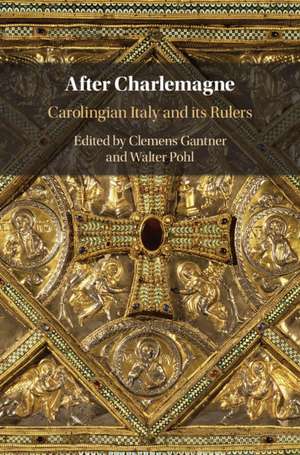After Charlemagne: Carolingian Italy and its Rulers
Editat de Clemens Gantner, Walter Pohlen Limba Engleză Hardback – 16 dec 2020
Preț: 573.38 lei
Preț vechi: 644.25 lei
-11% Nou
Puncte Express: 860
Preț estimativ în valută:
109.73€ • 116.49$ • 91.43£
109.73€ • 116.49$ • 91.43£
Carte tipărită la comandă
Livrare economică 26 decembrie 24 - 09 ianuarie 25
Preluare comenzi: 021 569.72.76
Specificații
ISBN-13: 9781108840774
ISBN-10: 1108840779
Pagini: 350
Dimensiuni: 160 x 235 x 20 mm
Greutate: 0.64 kg
Editura: Cambridge University Press
Colecția Cambridge University Press
Locul publicării:Cambridge, United Kingdom
ISBN-10: 1108840779
Pagini: 350
Dimensiuni: 160 x 235 x 20 mm
Greutate: 0.64 kg
Editura: Cambridge University Press
Colecția Cambridge University Press
Locul publicării:Cambridge, United Kingdom
Cuprins
1. Italy after Charlemagne: scope and aims of the volume Clemens Gantner and Walter Pohl; 2. A brief introduction to Italian political history until 875 Clemens Gantner; Part I. Was There a Carolingian Italy?: 3. Talking about the Carolingians in eighth- and ninth-century Italy Thomas F. X. Noble; 4. The name of the kingdom Paolo Delogu; 5. Was there a Carolingian Italy? Politics, institutions and book culture François Bougard; Part II. Organizing Italy: 6. The government of a peripheral area: the Carolingians and north-eastern Italy Stefano Gasparri; 7. Vassals without feudalism in Carolingian Italy Giuseppe Albertoni; 8. Shaping a kingdom: the sees of Parma and Arezzo between the reigns of Louis II and Berengar Igor Santos Salazar; Part III. Carolingian Rulers: 9. Staying Lombard while becoming Carolingian? Italy under King Pippin Marco Stoffella; 10. Carolingian fathers and sons in Italy: Lothar I and Louis II's successful partnership Elina Screen; 11. A king in training? Louis II of Italy and his expedition to Rome in 844 Clemens Gantner; Part IV. Cities, Courts and Carolingians: 12. A Byzantine cuckoo in the Frankish nest? The Exarchate of Ravenna and the Kingdom of Italy in the long ninth century Tom Brown; 13. Urbanism as politics in ninth-century Italy Caroline Goodson; 14. Rome and the others: saints, relics and hagiography in Carolingian north-eastern Italy Francesco Veronese; 15. Between the palace, the school and the forum: rhetoric and court culture in late Lombard and Carolingian Italy Giorgia Vocino; Bibliography.
Recenzii
'This collection of papers by leading international experts gives access to the immense cultural productivity and textual richness of Carolingian Italy, to its manifold regional traditions and to its continuous openness to external influence.' Stefan Esders, Freie Universität Berlin
'Gantner and Pohl have assembled a star-studded international cast to investigate the distinctiveness of ninth-century Italy. In challenging the very notion of 'Carolingian' Italy', this book offers rigorous and stimulating new interpretations of the narrative, documentary and manuscript sources concerning the politics, society and culture of Italy under Carolingian rule.' Rosamond McKitterick, University of Cambridge
'In the rich historiography on the Carolingians, less attention has in the past been paid to Italy; but now high-quality work is being done. This book brings that work together exceptionally well. It assembles the major experts on Carolingian Italy, and shows an exciting range of new approaches. All early medievalists will need to read it.' Chris Wickham, University of Oxford
'Highly recommended.' G. I. Halfond, Choice
'Gantner and Pohl have assembled a star-studded international cast to investigate the distinctiveness of ninth-century Italy. In challenging the very notion of 'Carolingian' Italy', this book offers rigorous and stimulating new interpretations of the narrative, documentary and manuscript sources concerning the politics, society and culture of Italy under Carolingian rule.' Rosamond McKitterick, University of Cambridge
'In the rich historiography on the Carolingians, less attention has in the past been paid to Italy; but now high-quality work is being done. This book brings that work together exceptionally well. It assembles the major experts on Carolingian Italy, and shows an exciting range of new approaches. All early medievalists will need to read it.' Chris Wickham, University of Oxford
'Highly recommended.' G. I. Halfond, Choice
Descriere
Offers new perspectives on the fascinating but neglected history of ninth-century Italy and the impact of Carolingian culture.
